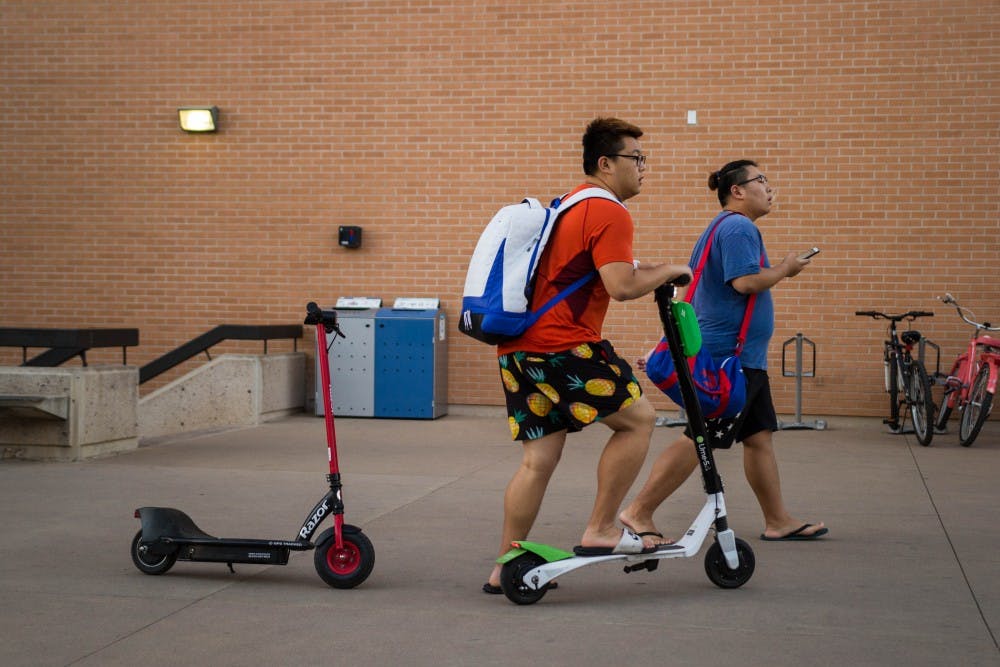First, it was the Birds. Then, it was the Limes. Next came the Razors.
Within a mere matter of months, electric dockless scooters have quickly become a campus staple. No matter what part of campus someone is on, it’s impossible to walk around without seeing at least a few of them.
Their rapid rise to popularity is thanks to the novelty and convenience they bring, but it isn’t without problems. These electric dockless scooters jeopardize student safety on campus and need to be more regulated.
Bird’s electric scooters first began to appear in Tempe in early May 2018. Since then, their presence of on campus and in Tempe has grown, and they have raised various community concerns about safety.
Read More: The pros and cons of electric dockless scooters
In September 2018, The State Press reported that Bird and Lime brought around 400 dockless scooters into the area for use. With the addition of new companies like Razor in the area following that article, the number only continues to increase.
These companies include safety regulations for their riders on their websites and on the scooters themselves.
“We strive to improve and enhance the well-being of our riders and communities through concrete action including restricting the maximum speed of the vehicles, requiring riders to upload a driver’s license and confirm they are 18 or older, providing an in-app tutorial on how to ride a Bird and how to park it and posting clear safety instructions on each Bird,” a Bird spokesperson said.
However, these regulations aren’t always followed by the riders. Students aren’t exactly monitored by the companies and can be reckless while they ride, some even having two to three people on one scooter at a time.
“I have seen students riding these on campus with little to no regards to their surroundings, which is dangerous as well considering the amount of foot traffic ASU campuses have,” medial studies sophomore Susan Vu said.
Vu said she is afraid that this recklessness can lead to potentially fatal injuries.
“Just last week, I saw a student crashing his scooter on the curb of a sidewalk and fell face down because he had problems controlling its speed," Vu said. "If this was to occur when a car was coming, it could’ve resulted in deadly injuries."
Having ASU officially regulate scooters on its campuses could prove useful in situations where official protocol is ignored. Although the city of Tempe has drafted agreements with the scooter companies to regulate usage, ASU should do its part in watching and regulating these scooters on campus.
ASU already has certain regulations, such as walk-only zones, to restrict motorized and manual modes of transportation in certain areas during certain times of day to protect students and improve foot traffic on campus.
However, the University needs to do more to target motorized scooters specifically.
Because these companies can’t strictly monitor every single rider on their app to ensure their safety, the University should step in to the do the job to protect all students on campus, rider or pedestrian.
“To ensure the safety of students who use these products, as well as those around them, officials should look into reinforcing stricter regulations than just walk-only zones, such as having traffic zone guards flagging down students and giving them warning when they violate the regulations, or look into having actual consequences that will motivate these students to follow safety precautions," Vu said.
Reach the columnist at jreksodi@asu.edu and follow @jfreksodiputro on Twitter.
Editor’s note: The opinions presented in this column are the authors’ and do not imply any endorsement from The State Press or its editors.
Want to join the conversation? Send an email to opiniondesk.statepress@gmail.com. Keep letters under 500 words and be sure to include your university affiliation. Anonymity will not be granted.
Like The State Press on Facebook and follow @statepress on Twitter.




